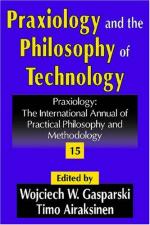|
This section contains 1,394 words (approx. 5 pages at 300 words per page) |

|
Praxiology, occasionally praxeology and rarely praxæology, is from the Greek praxis meaning goal-directed action, and logos in the sense of knowledge or information. Apparently having stipulative origins in French, namely, praxéologie (Mitcham), the lexical term praxiology was introduced by Tadeuz Kotarbiński (1886–1981) in 1965. Polish philosopher and co-founder, with Jan Łukasiewicz and Stanislaw Leśniewski of the Warsaw Center of Logical Research (Warsaw Circle), Kotarbiński used praxiology to reference an area in the philosophy of action that was distinguished from other such areas by its focus on efficient action. With adaptations to engineering, business, law, and more, and with discussions relating efficient action to mathematics, the natural sciences, technology, and ethics, praxiology has developed along three major lines: Kotarbińskian, analytic, and synthetic.
Kotarbińskian praxiology, also traditional or classical praxiology, begins with a practical situation said to be complex and exigent, and with a wish...
|
This section contains 1,394 words (approx. 5 pages at 300 words per page) |

|


